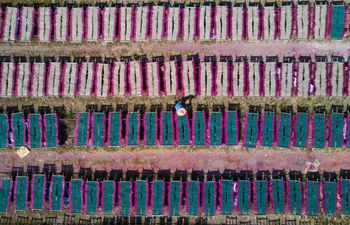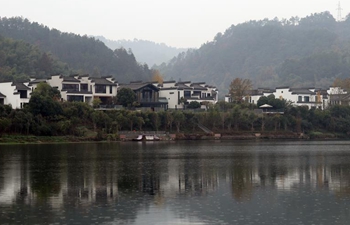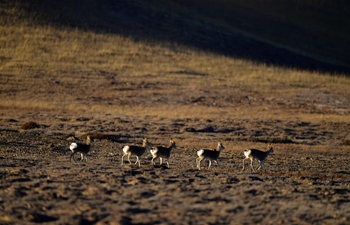by Olatunji Saliu, Sule Makama
ABUJA, Nov. 13 (Xinhua) -- Eating of insects, an old practice that cuts across different cultures and ethnic groups in the country, is providing a new means of livelihood for people especially in the northeastern state of Borno.
In that part of the country, despite the serious security challenge occasioned by the decade-long militancy of Boko Haram, hundreds of productive youths and women have ventured into the locust trade due to the high patronage of the tropical insect, to make ends meet.
The locust belongs to a family of migratory long-winged species of the grasshoppers commonly found in southern Europe, Asia, and Africa.
Entomophagy, which is the practice of eating insects by people, is very common in Borno, where diet-related chronic diseases and undernutrition are not uncommon, especially due to Boko Haram attacks.
According to local experts, the edible insect, which feeds on grass, is a source of essential nutrients and vitamins to humans.
Aisha Goni, a housewife and locust vendor in the city of Maiduguri, capital of Borno, told Xinhua she became the breadwinner of her family after her husband, Musa Goni, lost his job due to the incessant attacks by the Boko Haram group.
Goni, noting many locust sales outlets sprung up on major roads and strategic locations in the Maiduguri metropolis due to the high demand of the insects, described the business as "very lucrative."
She said the locust trade has so far enabled her family to earn a livelihood after they were displaced from their home in Gwoza, a town of Borno, following a deadly Boko Haram attack four years ago.
"I usually bought fresh insects from locust hunters, who harvested the insects in farmlands, before frying them for sale to consumers," Goni said.
On a daily basis, hundreds of people in the rural and urban areas of Borno continue to make brisk sales from this commercial venture.
It is not uncommon to see locals, including internally displaced persons (IDPs) like Goni and her family taking shelter in various camps across Borno, engaged in locust harvest, processing, and trading.
In most parts of the country, edible insect consumption is limited to the rural areas, said Baseerah Sarumi, an entomologist at the Federal Institute of Industrial Research (FIIRO) in Nigeria's Lagos State.
Sarumi said many of the people in the cities no longer eat insects because their dietary habits "are heavily Westernized".
"All insects are regarded as pests; something to get rid of. Many people view insects with disgust and believe that those people that eat insects are primitive, backward and not educated. For instance, it is very difficult to get edible insects in Lagos, the commercial center of the nation," she said.
In Borno, a 50-kg bag of fresh locust sells at 7,500 naira (20.6 U.S. dollars) in the market, said local entrepreneur Gladys David, also a student of the University of Maiduguri. She said she makes about 50,000 naira from the sales of the insect on a weekly basis.
Amid its growing demand, locust sale is, however, seasonal. It is abundant during the wet season when the supply is normally high. In dry seasons, the locust also experiences a hike in prices, especially due to the diminishing supply.
"A bag of fresh locust costs as much as 45,000 naira as against 7,500 naira when it is sold during the rainy season," said David, who hired two other women to assist in frying the insects and serving customers in her sales outlet.
"As a student, I comfortably pay my fees in school selling locust. It makes me save a lot, too, after paying those I hired to do the job for me," she told Xinhua.
In this part of Nigeria, and elsewhere in the country, insect farming is considered as a very good protein alternative to the conventional meat sources. Aside from that, it is considered very cheap and affordable by low-income earners.
In an interview with Xinhua, Abdulazeez Maina, a nutritionist at the University of Maiduguri, said the high nutritional quality of locust qualifies it as a food and as a good supplement in animal feed.
According to Maina, the locust is good for human consumption as it contained about 64 percent nutritional supplements needed for healthy body growth.
The consumption of the insect, the university don said, provides the necessary protein for brain development and is also rich in Vitamin B12, which is known to be good for pregnant women.
Maina said eating the insects could further serve as a stabilization agent for the metabolism of persons with diabetic conditions and other health complications, due to its rich nutrients.
"Locust contains high calcium, it helps maintain dental and bone density and reduces back pain in pregnant women," he said.
When eaten regularly, the nutrition expert said, locusts help in preventing osteoporosis and are highly recommended for persons recuperating from a bone fracture.
"It also stimulates the body to produce red blood cells in sufficient quantities which protect against amnesia," added Maina.













